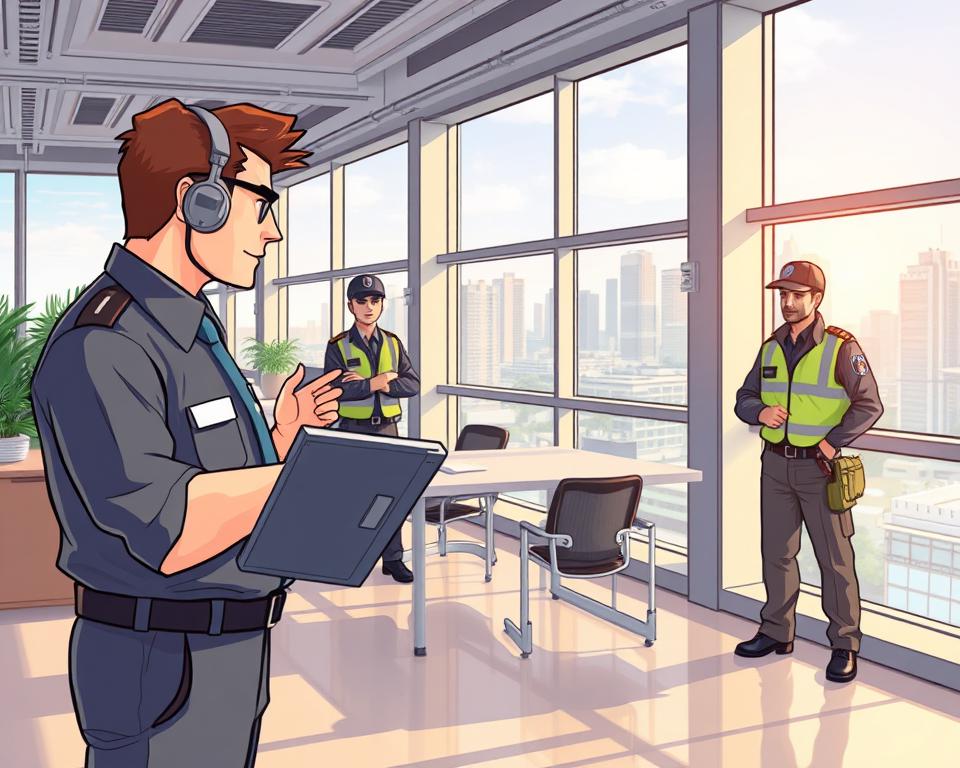Improving Safety via Hospital Security Guards
Did you realize that medical centers experience roughly 30 violent episodes each day? This shocking statistic underscores the crucial function of Hospital Security Guards. They secure patients, employees, and sensitive information. In today’s fast-changing healthcare world, robust Healthcare Facility Security is key. It involves establishing secure environments where patients receive care free from violence or privacy risks.
Partnering with experienced firms like Divine Protection Services enhances Medical Center Security Services. This ensures security stays front and center without limiting accessibility. This write-up delves into how commercial property patrol strategies and monitoring setups can substantially bolster security efforts. It covers threats from within and beyond effectively.

Key Insights
- Hospital Security Guards are crucial for defending patients, staff members, and sensitive records.
- Healthcare Facility Security is necessary to curb violence and preserve confidentiality.
- Integrated security solutions amplify the overall performance of hospital security services.
- Collaboration with firms like Divine Protection Services ensures tailored security solutions.
- State-of-the-art technologies are the foundation of present-day healthcare security solutions.
- Juxtaposing access and confidentiality is essential for robust hospital safety protocols.
The Critical Role of Hospital Security
Hospital security is critical for the safety of patients and staff, as well as the protection of sensitive information. The escalation of violence in medical environments points to the importance of vigilant Hospital Security Guards. These officers are indispensable for preserving a secure setting and protecting everyone’s rights and dignity.
Applying solid Healthcare Facility Security tactics is critical to deter hostile actions. This assists in fostering a caring atmosphere, enhancing the experience for patients and families. It further guarantees adherence to regulations such as HIPAA, requiring secure access controls to shield Protected Health Information (PHI). Such measures not only safeguard patients but also foster trust between healthcare providers and their communities.
| Category of Security Intervention | Significance | Adherence to Rules |
|---|---|---|
| Access Control Systems | Restrict unauthorized entry and access | Vital for meeting HIPAA requirements |
| Surveillance Cameras | Monitor activities and deter criminal behavior | Aids in meeting safety regulations |
| Emergency Response Plans | Offer immediate action during crises | Compliant with safety and emergency management guidelines |
| Training for Security Personnel | Equip staff with skills to handle crises | Meets required safety and security norms |
Allocating resources to strong security protocols and personnel training is vital for safeguarding hospitals and health facilities. These protocols ensure a safe and compliant environment, vital for delivering quality patient care.
Function of Hospital Security Guards
Hospital security officers serve a crucial function in maintaining safety within medical centers. They monitor access points to stop unauthorized entry, handle emergencies, and use conflict resolution to prevent threats. Trained by Divine Protection Services, they recognize and mitigate signs of distress or violence.
Their presence is key to the safety and well-being of patients and staff. They safeguard the hospital’s functions, vital for a therapeutic atmosphere. By providing protection, they boost patient satisfaction and decrease threats.
Advanced Technologies in Hospital Security
Today’s medical centers are progressively using Advanced Technologies to reinforce their security protocols. Medical Center Security Services effectively integrate systems like AI-driven surveillance cameras, which enhance monitoring capabilities. These systems deliver instant monitoring and insights, empowering personnel to react to incidents quickly.
A fundamental part of Healthcare Security Solutions is utilizing access control systems. These solutions confine entry to restricted areas, ensuring that only sanctioned personnel can access crucial sections. By leveraging biometric authentication, medical centers can integrate extra security around patient data and vital medical apparatus.
Artificial intelligence security applications are pivotal for physical safeguarding. Face recognition and behavior analysis allow security teams to react quickly to security incidents. High-level video analytics aids in operational choices, offering nonstop monitoring of hospital premises. This creates a safe atmosphere for patients and staff.
| Technology | Application | Gains |
|---|---|---|
| AI-driven Surveillance | Real-time monitoring | Immediate threat identification |
| Access Control Systems | Restricted entry | Securing critical zones |
| Facial Recognition | Identifying individuals | Blocking illicit entry |
| Video Analytics | Surveillance management | Insight-based strategies |
Advanced Technologies not only protect hospital assets but also contribute to creating a safe environment for all. By employing these advanced technologies, healthcare facilities can maintain vigilance against threats. This ensures a high standard of care for patients.
Hospital Security Approaches
Robust Healthcare Facility Security tactics are necessary to secure patients, personnel, and visitors within medical facilities. Executing detailed risk analyses is the basis of these approaches. By recognizing gaps, medical centers can devise customized procedures for different scenarios. This elevates their preparedness for any possible incidents.
It’s crucial to promote the reporting of suspicious activities and dangers. Medical centers need frameworks in place to react swiftly to those reports. This anticipatory position in Healthcare Facility Security builds a community-wide safety mindset.
Handling visitor flow is a fundamental element of Medical Center Security Services. Confirming that only sanctioned people enter maintains a secure atmosphere. Overseeing exchanges between patients and medical staff further reduces threats. This ensures a safer environment for everyone. Below you’ll find a table showcasing central aspects of strong security strategies.
| Security Element | Description | Benefits |
|---|---|---|
| Risk Assessments | Spotting weaknesses and evaluating potential hazards. | Enhances readiness and reaction speed. |
| Incident Reporting | Motivating staff and visitors to flag unusual behavior. | Facilitates timely responses to threats and increases awareness. |
| Visitor Management | Protocols for monitoring and controlling access to facilities. | Enhances security and reduces unauthorized access. |
| Staff Training | Delivering security instruction to employees. | Equips staff with capabilities to address security concerns. |
Training Security Personnel Effectively
Proper training of hospital security staff is critical for upholding safety in medical centers. Persistent schooling supports staff in meeting new security challenges. It further enhances their capacity to react effectively in varied scenarios.
Divine Protection Services focuses on cultivating robust situational awareness among security teams. This encompasses mastering conflict resolution techniques for tense interactions. Regular drills and simulation exercises reinforce protocols. Teams are trained to address dangers effectively while preserving dignity and respect.
This approach to training security personnel goes beyond defensive practices. It nurtures a culture of protection and expertise in hospital settings. By emphasizing essential skills, medical centers guarantee their security staff can face threats competently.
Conforming to Regulatory Criteria
Adhering to Regulatory Standards is critical for medical centers striving for safety and credibility. HIPAA, specifically, enforces secure access management to defend Patient Health Information (PHI). These procedures stop unapproved access and guard against data leaks.
Hospitals can strengthen their compliance by instituting detailed protocols. These include regular audits, staff training, and clear incident reporting processes. These practices not only safeguard patient health but also cultivate community trust.
Firms such as Divine Protection Services deliver custom compliance plans for healthcare institutions. Their experience in Hospital Security Services confirms that security officers are equipped to comply with regulations.
Adherence to compliance lessens risks and cultivates robust patient-provider relationships. An anticipatory approach to regulations advantages the whole healthcare framework.
Hospital Security Personnel in Action
Hospital Security Officers are vital in keeping healthcare facilities safe. Their efforts appear in numerous practical scenarios, showcasing their anticipatory methods. In one case, they address altercations in reception areas, promptly de-escalating them to impede violence.
During critical situations, these guards accompany people to secure spots, aiding them when needed. This measure shields those at risk and preserves a peaceful setting. Their coordination with police in crises underscores the importance of Professional Healthcare Security. They frequently act as initial responders.
Guidance from Divine Protection Services readies these guards to address emergency situations proficiently. They learn to enforce rules while respecting everyone’s dignity. This fusion of authority with compassion establishes them as indispensable to the healthcare team. They endeavor to maintain safety and security for every person in the facility.
Customizing Security Solutions for Healthcare Facilities
Healthcare institutions confront distinct security hurdles that necessitate a personalized approach. Customizing Security Solutions is key to effectively tackling these issues, ensuring a safe space for both patients and staff. Working with experts like Divine Protection Services enables hospitals to create security programs that fit their specific needs.
A comprehensive security plan addresses essential aspects such as violence deterrence and drug security. With state-of-the-art technologies, hospitals can strengthen safety protocols while remaining HIPAA-compliant. This typically involves visitor screening platforms and adaptable access control systems to suit changing requirements.
The duties of Medical Facility Guards are critical as well. They benefit from targeted training to deal with security episodes and ensure sustained vigilance. Their visibility deters potential threats and instills confidence in employees and patients.
Presented here is a table depicting how Adapting Security Solutions resolves multiple healthcare challenges:
| Issue | Personalized Remedy |
|---|---|
| Violence Prevention | Coaching Medical Facility Guards in calming and negotiation tactics |
| Medication Security | Installation of secure medication storage and monitoring systems |
| Visitor Management | Sophisticated guest screening and ID badge protocols |
| Access Control | Adaptive access control systems that adjust based on facility activity |
By carefully planning and partnering with the right organizations, healthcare facilities can establish a strong security posture. This is achieved through Customizing Security Solutions to their unique requirements. Combining human oversight with technology significantly improves safety, leading to a more secure and efficient healthcare setting.
To Summarize
Ensuring the safety and well-being of patients, staff, and sensitive information is vital in healthcare facilities. Hospital Security Guards today employ cutting-edge technologies and instruction to fight contemporary risks. This evolution not only secures physical spaces but also fosters trust among patients and healthcare providers.
Tailored Healthcare Security Solutions enable hospitals to lead in the evolving security environment. Collaborating with seasoned organizations such as Divine Protection Services arms healthcare centers to manage safety challenges proficiently. By integrating workforce training with advanced tech, hospitals can develop a safe environment for medical treatment and care.
The health sector grapples with escalating risks, making professional security steps vital. Hospitals have to integrate these progressing strategies to fortify their environments and uphold operational honor.
